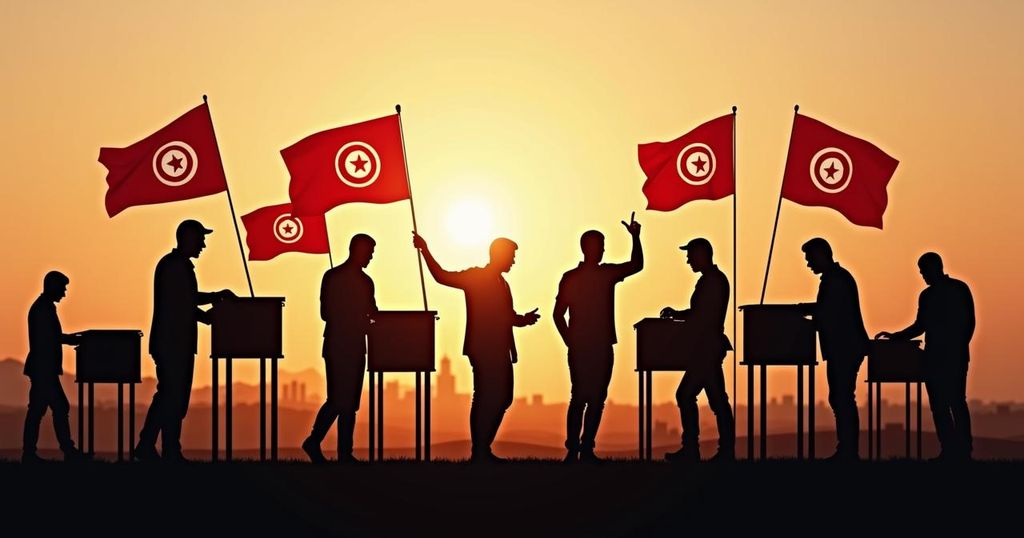Tunisia’s Presidential Election: The Struggle Against Authoritarianism and the Quest for Democracy
The upcoming Tunisian presidential election is surrounded by an atmosphere of repression, lack of public engagement, and skepticism regarding its legitimacy. President Kais Saied’s authoritarian measures have systematically dismantled democratic institutions since his coup in 2021, leading to widespread arrests of dissenters and opponents. As the election approaches, protests and public opposition are growing, reflecting a critical moment in Tunisia’s political evolution and a potential push towards restoring democracy.
In Tunisia, the approach of the presidential election on October 6 has been markedly subdued, lacking the vibrant campaigning and public engagement characteristic of previous elections from 2011 to 2019. President Kais Saied, who originally gained political prominence in the 2019 elections by promising to fulfill the aspirations of the Tunisian Revolution, has since executed a coup on July 25, 2021, undermining the democratic institutions that initially elevated him to power. Saied’s consolidation of authority has included oppressive measures against dissent, resulting in the imprisonment of notable political opponents, including Rached Ghannouchi, former speaker of parliament. As the election draws near, the environment reflects rising tension, exemplified by a marked increase in arbitrary arrests targeting dissenters and opponents of Saied’s regime. Numerous candidates seeking to challenge Saied have either been barred from participating through judicial means or imprisoned, limiting political discourse and scrutiny of the electoral process. For instance, leading opposition figure Ayachi Zammel, despite being imprisoned, remains on the ballot, symbolizing the resistance against Saied’s autocratic approach. The electoral commission and judiciary exhibit a lack of independence, effectively eliminating any fair competition. The regime’s attempts to curtail the influence of established election monitoring organizations and to dismiss potential electoral complaints mirror its overarching strategy to retain authoritarian control. In this context, the authority of the electoral board has been called into question, particularly following its refusal to acknowledge established monitoring entities, raising concerns about transparency and fairness. Protests have emerged as a response to Saied’s increasingly autocratic rule, reflecting a growing sense of public discontent. As citizens become aware of the election’s compromised legitimacy, there is an emerging sentiment that participating in the electoral process, despite its flaws, could be crucial for restoring democracy in Tunisia. The current climate signifies that this election will not merely serve as a legitimate endorsement of Saied’s governance but may rather act as a catalyst for renewed opposition against his rule.
This article discusses the political climate in Tunisia leading up to the presidential election scheduled for October 6. It highlights the significant shift from the previously vibrant electoral processes to the current atmosphere characterized by repression and the consolidation of authoritarianism under President Kais Saied. Following a coup, Saied dismantled democratic institutions and has since faced declining support due to his failure to fulfill the promises tied to his rise to power. The backdrop of heightened arrests and suppression of dissent illustrates the increasing tensions leading to the election, raising concerns about the integrity of the electoral process and the possibility of significant public opposition.
The imminent presidential election in Tunisia poses a critical juncture for the nation, symbolizing the struggle between authoritarianism and democratic aspirations. President Kais Saied’s systematic dismantling of democracy has led to widespread disillusionment among the populace and a renewed commitment to oppose his regime. Despite the election being largely perceived as a mechanism to legitimise Saied’s continued hold on power, it simultaneously presents an opportunity for renewed opposition to mobilize and advocate for a return to democratic governance. The outcomes of this election could have lasting implications for Tunisia’s political landscape.
Original Source: www.middleeasteye.net




Post Comment